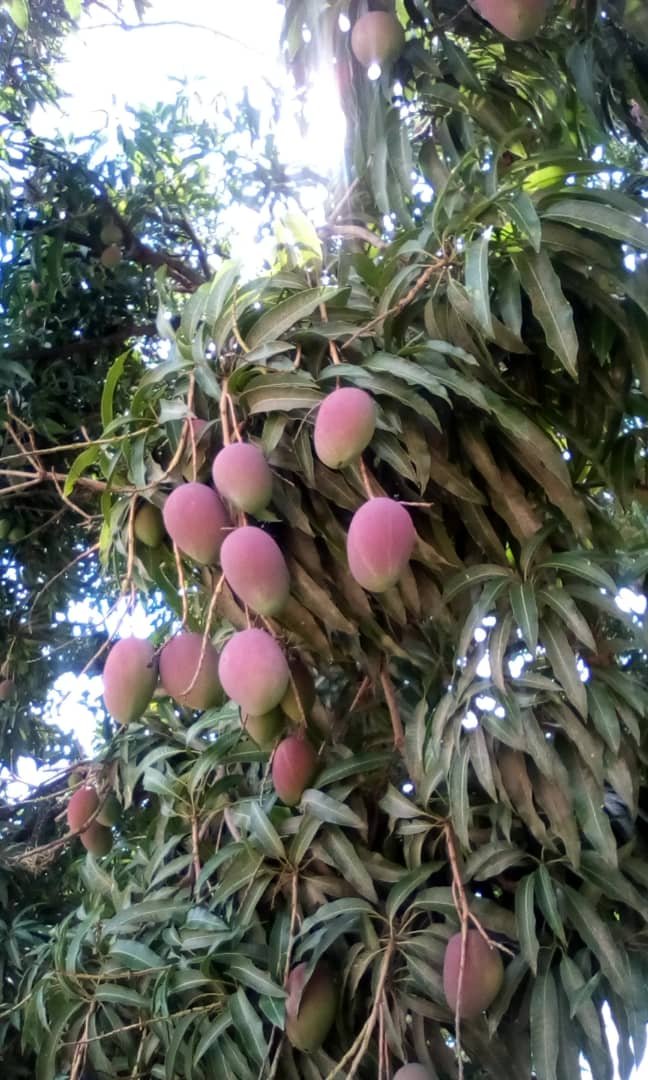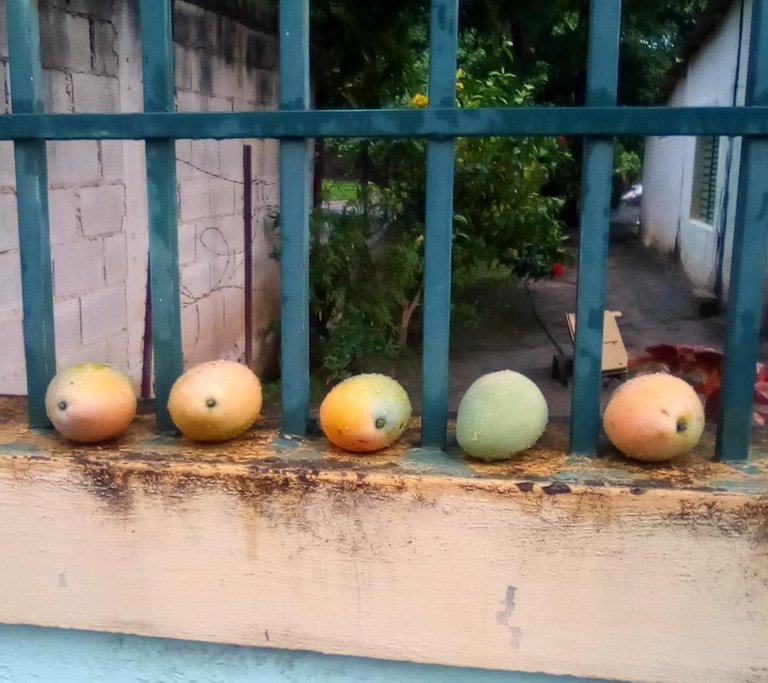QUITA RUIDO

Lo llaman "QUITA RUIDO", porque al comer, se les calma los ruidos, o sonidos que produce el estómagos, cuando se tiene hambre. Y los mangos llegaron ha ser, el menú especial para calmar los ruidos del estómago. En nuestro país hubo un hambre tan severa, que en el año 2019, lo único que se podía adquirir era sardinas y mangos. Pero los mangos, dieron ese toque especial para la economía y degustación de los venezolanos.¿Por qué? ¿A quién no le gusta un mango? Sabemos que a todos nos gusta comer un mango bien madurito o pintoncito, como lo quieran comer cada persona. Lo importante es que a todos nos gusta comer mangos. Cada quien le gusta a su manera comer un buen mango. Los "Mangos", fue lo que permitió calmar el ruido del estómago en esos tiempos de crisis agudo del venezolano. Donde el venezolano vió la oportunidad de montar su negocio con sus cosechas de "Mangos". Fue su único punto de apoyo para su economía y poder mantener a su familia y al mismo tiempo ayudar a los menos favorecidos. Por lo tanto esta expresión se llegó a popularizar en Venezuela, como " EL QUITA RUIDO". Era lo único que tenían muchas familias, para calmar el hambre en sus casas. Esto sucedió en el año 2019 y el " QUITA RUIDO", refiriéndose al único menú de aquellos tiempos, que era llevar mangos a muy bajos precio, se popularizó, hasta el día de hoy. Es que fue una crisis económica tan grande que los padres de familia, con una economía estable, quedaron sin trabajo, el alto costo de los alimentos y de los servicios básicos no se podían costear, y gracias a Dios, nuestro Padre Celestial mediante las cosechas de mango, muchas familias pudieron calmar el hambre con mangos, hasta llegaron a freír mangos para poner el plato en la mesa para que sus hijos no se acostaran sin comer. Para nadie ha sido un secreto la miseria en la que ha sido sometida el venezolano, pero el buen venezolano es trabajador y echado "para' lante", y se las ingenia para no morirse de hambre. En ese tiempo, todos iban a las parcelas a buscar mangos, y con eso podían alimentarse y vender a bajos precios para así llevar el sustentos a sus hogares. Era muy común ver en las calles a niños, mujeres y hombres cargar sacos y tobos llenos de mangos, subiéndose en los autobuses,pidiendo colas para llegar a sus destinos, para empezar a vender sus mangos. Luego se veía en las calles principales de las ciudades, en proseción con sus cosechas e ir gritando "Compran Mangos". Triste realidad la de mi país.
** REMOVE NOISE
IMG-20210501-WA0032.jpg
They call it "QUITA RUIDO", because when eating, it calms the noises, or sounds produced by the stomach, when hungry. And the mangoes became the special menu to calm the noises of the stomach. In our country there was such a severe hunger, that in the year 2019, the only thing that could be acquired was sardines and mangos. But mangoes, gave that special touch to the economy and tasting of Venezuelans.why, who does not like a mango? We know that we all like to eat a ripe mango or a small mango, whichever way each person wants to eat it. The important thing is that we all like to eat mangos. Everyone likes to eat a good mango in their own way. The "Mangos", was what allowed to calm the noise of the stomach in those times of acute crisis of the Venezuelan. Where the Venezuelan saw the opportunity to set up his business with his crops of "Mangos". It was his only point of support for his economy and to be able to support his family and at the same time help the less favored. Therefore this expression became popular in Venezuela, as "EL QUITA RUIDO". It was the only thing that many families had, to calm the hunger in their homes. This happened in the year 2019 and the " QUITA RUIDO", referring to the only menu of those times, which was to take mangos at very low prices, became popular, until today. It was such a big economic crisis that the parents, with a stable economy, were left without work, the high cost of food and basic services could not be afforded, and thanks to God, our Heavenly Father through the mango crops, many families were able to calm hunger with mangoes, they even fried mangoes to put the plate on the table so that their children did not go to bed without eating. For nobody has been a secret the misery in which the Venezuelan has been subjected, but the good Venezuelan is hardworking and "para' lante", and manages not to starve. At that time, everyone went to the plots of land to look for mangoes, and with that they could feed themselves and sell at low prices to bring sustenance to their homes. It was very common to see in the streets children, women and men carrying sacks and sacks full of mangoes, getting on buses, asking for queues to get to their destinations, to start selling their mangoes. Then you could see them on the main streets of the cities, standing with their crops and shouting "Buy Mangoes". Sad reality of my country.
Translated with www.DeepL.com/Translator (free version)
En Valencia y en Caracas, es común ver que los vecinos coloquen los mangos en sus puertas para que el que pase y quiera llevar mangos los agarren. Así que los que desean llevar mangos salen con sus bolsas de una vez de sus casas, para ir recogiendo mangos a lo largo del camino, que están puesta al frente de las casas que tienen cosechas de mangos. Estos vecinos colocan en el frente de sus porche los mangos que no van a utilizar, para el que pase se los lleven, si los desean. Esto permite calmar el deseo del que quiere comer mangos,y que no tiene para comprar mangos y disfrute de comer de esa delicia, y al mismo tiempo el que tiene mangos no se les pudra en sus hogares y se les llene sus casas de moscas.

In Valencia and Caracas, it is common to see that neighbors place mangoes on their doorsteps so that whoever passes by and wants to carry mangoes can grab them. So those who want to carry mangoes leave their bags at once from their houses, to go picking mangoes along the road, which are placed in front of the houses that have mango crops. These neighbors place in front of their porches the mangoes that they are not going to use, so that whoever passes by can take them, if they wish. This allows to calm the desire of those who want to eat mangoes, and who do not have to buy mangoes and enjoy eating this delicacy, and at the same time those who have mangoes do not rot in their homes and fill their houses with flies.

** Para mi esto es una muestra de amor al prógimo , porque son muchos los que no los pueden comprar, porque su poder adquisitivo no se los permiten. Es que, si nos ponemos a analizar, un empleado público gana menos de tres dólares al mes, y ¿cómo pueden comprar mangos,teniendo que cubrir otros gastos de mayor importancia? . Sin embargo el que tiene una mata de mangos en Venezuela, puede ayudar a mitigar el ruido del estómago a muchas familias.
Y que " El Mango", por su extraordinario aroma, sabor y color, es una fruta muy sabrosa. Y el mango aporta 60.8 caloría, por cada 100 gramos, 0,5 de proteínas, 0,10 de grasa, 15,30 g de hidratos de carbono y 1,50 g de fibra. Entonces podemos ver que esta fruta tan común puede aportar los nutrientes básicos que necesita el cuerpo para estar bien alimentado diariamente aunque no consuman otro tipo de alimentos. La arepa que es el alimento tradicional del venezolana se ha puesto mas cara para el venezolano, así que el que puede, prefiere llevar cinco kilos de mangos por un $, que comprar un kilo de harina pan, por 1,5 $. Muchos dicen que le salen mejor, comprar los mangos, que comprar una harina Pan, ya que comen más y se alimenta mejor su familia.
Lo positivo de todo esto es que los venezolanos, aunque "Lleven más Piedras que una Mata de Mangos", siempre se ven sonriendo y felices,a pesar de la crisis. Por lo tanto debemos copiar su ejemplo. Esto nos muestra que la felicidad no está en tenerlo todo, sino la manera como llevemos nuestras vidas, sea poco o mucho, debemos ser felices, porque sea como sea " La vida es bella".
Me despido muy cariñosamente: Bere56
For me this is a sign of love for our fellow man, because there are many who cannot buy them, because their purchasing power does not allow them to do so. If we analyze, a public employee earns less than three dollars a month, and how can they buy mangos, having to cover other more important expenses? However, the one who has a mango tree in Venezuela, can help to mitigate the stomach rumbling of many families.
And that "Mango", for its extraordinary aroma, flavor and color, is a very tasty fruit. And the mango provides 60.8 calories per 100 grams, 0.5 of protein, 0.10 of fat, 15.30 g of carbohydrates and 1.50 g of fiber. So we can see that this common fruit can provide the basic nutrients needed by the body to be well nourished daily even if they do not consume other foods. The arepa which is the traditional food of the Venezuelan has become more expensive for the Venezuelan, so whoever can, prefers to take five kilos of mangoes for $ 1, than to buy a kilo of flour bread, for $ 1.5. Many say that it is better for them to buy the mangoes than to buy a kilo of bread flour, since they eat more and feed their families better.
The positive thing about all this is that Venezuelans, even if they "carry more stones than a mango tree", are always smiling and happy, despite the crisis. Therefore we should copy their example. This shows us that happiness is not in having everything, but the way we lead our lives, whether it is little or much, we must be happy, because no matter how "Life is beautiful".
I bid you a fond farewell: Bere56
Translated with www.DeepL.com/Translator (free version)

